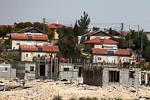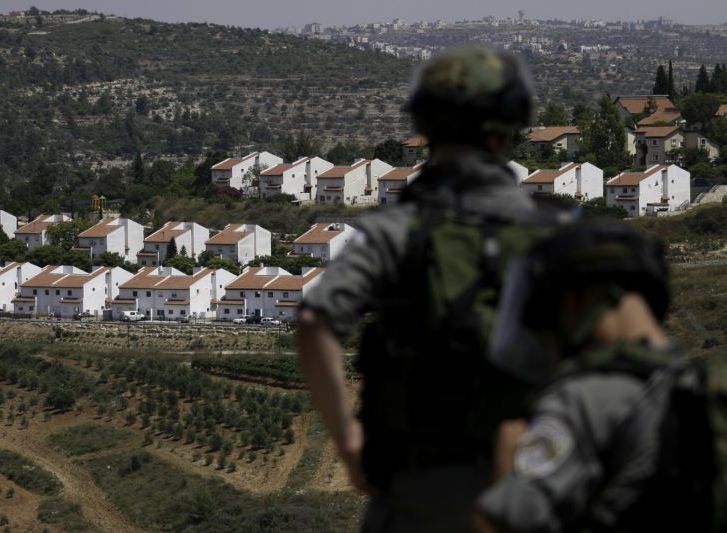Responses of Israeli government and attorney general in Settlements Regularization Law Case (January 2018)
CLICK HERE to read or download this briefing paper in PDF format
On 6 February 2017, the Israeli Knesset (the parliament) enacted the "Settlements Regularization Law for Judea and Samaria [the West Bank]", which allows Israel to expropriate private Palestinian land in the West Bank and to “regularize” or “legalize” the Israeli settlements built on it.[1] The law "legalizes" these settlements under Israeli domestic law. According to the government, the scope of Israeli construction on private Palestinian land in the West Bank amounts to 3,455 structures.
The law violates international humanitarian law (IHL) and international human rights law (IHRL) as they apply to occupied territory, as well as the basic principle of equality before the law. It permits the expropriation of vast tracts of private Palestinian land, giving absolute preference to the political and ethno-ideological interests of Israel as an occupying power and to Israeli settlers.
Immediately following the enactment of the law, Adalah – The Legal Center for Arab Minority Rights in Israel, the Jerusalem Legal Aid and Human Rights Center (JLAC), and the Al Mezan Center for Human Rights (Gaza) submitted a petition to Israel’s Supreme Court on behalf of 17 Palestinian West Bank village councils demanding that the law be revoked.[2] The case is currently pending before the Supreme Court, and is scheduled to be heard on 3 June 2018 by an expanded panel of nine justices.[3]
Two responses to the petition have been submitted to the Supreme Court, one by the Government of Israel, and the other by the Attorney General (AG). The Government of Israel used private attorneys to submit its response, as the AG, the usual representative of the government before the Supreme Court, refused to represent the government in this case, as his legal opinion differs from that of the state concerning the law.
This law raises a number of issues connected to international and Israeli law. In this briefing paper, we will address a number of key issues raised in the petition, and in the government's response and the Attorney General's response to those issues. Our goal is not to provide a comprehensive review and examination of all the legal issues stemming from these responses, but to highlight and draw attention to some of the most crucial points.
The Response of the Government of Israel
In August 2017, the Government of Israel submitted its response to the petition,[4] in which it argued, inter alia, that:
- Jewish settlement in the West Bank fulfills the values of Zionism;
- The Settlement Regularization Law is justified by its political, national and social purposes.
- It is the “natural right” of Jewish Israelis to live in this area;
- The Israeli legislator (the Knesset) is the source of the authority of the military commander in the West Bank, and that this legislator is not subject in any way to international law; and
- Israeli settlers in the West Bank are a local civilian population under international law whose needs must be addressed by the Military Commander.
The Legal Status of the West Bank
In total contrast to the unequivocal international position on the matter,[5] the government claims in its response to the petition (para. 19) that the West Bank is not occupied territory but rather a territory under the effective control of Israel, which “took control of the area in a defensive war from an illegal sovereign who unlawfully seized it; and that it – Israel – has convincing, well-founded legal arguments regarding it.”
The rules of IHL apply to Israel’s actions in the West Bank by virtue of its status as occupied territory.[6] However, the government claims (para. 19) that since – in its view alone – the West Bank is not occupied territory, “the laws of occupation (i.e. the laws of belligerent occupation), both customary international law and treaty law do not, de jure apply to the reality of Israeli control over the area.” It then clarified (para. 21) that the policy of Israeli governments “was to de facto subordinate the government to the humanitarian provisions of the laws of belligerent occupation, without recognizing their de jure applicability.” It further stated (para. 24) that such conduct in the territory of the West Bank is, “based on and possible only due to the fact that Israeli law allowed the absorption of these norms into Israeli law” (emphasis in the original), since “the source of the authority of the Military Commander in the area is his position as an agent of the State of Israel and of Knesset legislation” (para. 23).
Moreover, the government argued (para. 21) that the Knesset has full authority to enact laws that apply in the West Bank, and that it is not subject to international law regarding this matter: “Israel did not refrain from applying the laws of Israel to East Jerusalem through Knesset legislation. It is reasonable to assume it would have refrained from this had it adopted the interpretive position that it is subordinate to the laws of belligerent occupation as they stand, which prohibit de facto annexation. In fact, the willingness of the executive branch – via successive Israeli governments – to subordinate itself to the aforementioned laws of belligerent occupation cannot bind the legislative branch, the Knesset. Nonetheless, even if there was a contradiction between the application of Israeli law to East Jerusalem or the Golan Heights and the laws of belligerent occupation, the fact remains that the Knesset has never subordinated itself to these or other provisions of international law.”
The Legal Status of Settlements and the Settlers
International humanitarian law prohibits the State of Israel, as an occupying power, from exploiting occupied territories for its own political needs and the needs of its own citizens, including settlement construction.[7] In direct contrast, the government argued in its response (para. 97) that “Israeli settlement in the area [of the West Bank] is a worthy value since Jewish settlement throughout the Land of Israel [including the West Bank] has always […] been a Zionist value of the highest order […] The fact that the people of Israel have a deep connection to these parts of the Land of Israel is not under dispute. In any case, the right of Israeli citizens to realize this connection by establishing the center of their life in the area is one of many natural derivatives of this value.” It further stated (para. 3) that “Many Israelis – some the second and third generation of the Israeli settlement in the area [the West Bank] – have a natural right to establish their homes in the area ...”
The government also clarifies its position (para. 231.6) that, “The Israeli population in the area is a local population for whose benefit the military commander must act," and that “the expropriation of land for the benefit of the local population can also be undertaken for the benefit of the Israeli population” as the local population consists of “the total population living in an area under military control” (para. 266). Hence, the government concludes in its opinion that the provisions of the Hague Regulations also apply to the settler population in the West Bank.
The Violation of Palestinians’ Property Rights
The Settlements Regularization Law instructs the Military Commander in the West Bank to expropriate private Palestinian land that Israeli settlers occupied and built on before the enactment of the law (Article 3), without legal permission, and to award this land to the settlers, retroactively “legalizing” the settlements.
In its reply, the government admitted (para. 93) that “The overriding goal of the law is to regulate the status of those [Israeli] settlements, neighborhoods or houses whose regulation has been prevented until now primarily due to the fact that the right of ownership of those lands is not in the hands of the state or of those who hold it.” It added (para. 88), “The demolition of thousands of buildings in the area, even if the grounds for doing so are legal flaws arising from the process of their construction, including incursions onto private property, is something that should be avoided even at the cost of infringing on the right to property of private individuals [Palestinian residents of the area]. This is a humane-social purpose.”
This position directly contradicts Article 46 of the Hague Regulations, which, inter alia, determines the need to respect the right to property and expressly prohibits the expropriation of private property. Crucially, this provision protects the right to property not only from total confiscation, but also from restrictions that infringe upon this right, such as the seizure of land and the prevention of land use. In this context, the payment of compensation, as provided for by the Settlement Regularization Law, does not remedy the violation of property rights.
As stated above, the government emphasized that Knesset legislation overrides the provisions of international law (also para. 262). In addition, the government specifically insists that Article 46 of the Hague Regulations refers only to confiscation without compensation (para. 272), claiming (para. 274) that, “In fact, the laws of belligerent occupation – the Hague Regulations and the Geneva Convention – remain silent regarding the power of expropriation, i.e. acquisition in return for payment, in territory subject to belligerent occupation [...] Hence, the laws of belligerent occupation do not prohibit the expropriation of rights in return for payment ... as stipulated in the mechanism set in Section 3(2) of the Settlement Regularization Law.” According to the government, “The Geneva Conventions contain almost no restriction regarding the protection of property, and there is no restriction on the specific expropriation of private property” (para. 267).
The Response of the Attorney General
In a separate opinion submitted to the Supreme Court in November 2017, the attorney general (AG) provided his position regarding the law.[8] The AG supports the cancellation of the law because it is "an extreme and sweeping arrangement" that is disproportionate, but he simultaneously presents a clear position that contradicts international law applying to the occupied territories:
"The desire to provide a worthy response to this problem [the plight of settlers whose homes are not situated on state lands,] in cases in which innocent settlers were caught up in situations not to their advantage, is a proper purpose."
For years, there have been a number of tools available via which it is possible to "authorize" settlements on private Palestinian land transferred to settlers "in good faith." These tools include:
- Activation of Article 5 of the Order Regarding Government Property (Judea and Samaria) (Order Number 59), which provides that "every deal made in good faith between the supervisor and another individual over all property that the supervisor thought was government property at the time of the deal, will not be disqualified and will remain valid even if it is proven that the property was not government property at the time of the deal";
- "Expropriation for public purposes": In another opinion issued by the AG in November 2017 regarding the access road to the Harsha settlement, partially built on private Palestinian land, the AG opined that, in the wake of High Court ruling Ziada (HCJ 794/17 Ziada v. IDF West Bank Commander) which ruled, amongst other conclusions, that because settlers are considered a "civilian population" who "are also considered the responsibility of the military commander", (Ziada, paragraph 26 of the ruling), there is no additional legal impediment to the advancement of "regulating access to the Harsha settlement via expropriation for public purposes, at least with respect to the expropriation of the right to possess the land, which will bear the obligation to pay compensation to the owners of the rights therein […]" (page 3 of the AG's opinion of 08.11.2017).
It is clear that the AG's position violates international law, which explicitly forbids the construction of settlements and the transfer of the civilian population of an occupying power into occupied territory, and views them as war crimes. International law also includes explicit bans on harming the property of the Palestinian population in the West Bank for the purposes of development and expansion of settlements.
[2] HCJ 1308/17, The Silwad Municipality, et al. v. The Knesset, et al. (petition pending). See the petition (English, translation by Adalah).
[3] On 17 August 2017, the Supreme Court issued a partial injunction freezing the operative parts of the law (e.g., no orders towards the legalization of these settlements may be issued), while the case is pending. On 4 December 2017, the Supreme Court issued an "order nisi", in which it ordered the Government of Israel to explain "Why should it not be determined that the Settlement Regularization Law is invalid in all areas of the West Bank, and that [Israel's West Bank military commander] is therefore forbidden to act in accordance with the law… and why should it not be determined that the Settlement Regularization Law is null and void since it is unconstitutional." See the Court's decision in Hebrew.
[5] As confirmed by the International Court of Justice (ICJ) in its Advisory Opinion of 9 July 2004 concerning the Separation Wall built by the Israeli government in the West Bank. The ICJ emphasized the status of all of the territories occupied by Israel in 1967 as occupied territory (paras. 98-99 of the Advisory Opinion). The Advisory Opinion is available here.
[6] These laws are primarily anchored in the 1907 Hague Convention on the Laws of War and its accompanying regulations, the provisions of the 1949 Fourth Geneva Convention relative to the Protection of Civilian Persons in Time of War, the customary provisions set in the 1977 protocols to the Geneva Conventions, and the general principles of international law. This legal framework was upheld by the International Court of Justice (ICJ) in its Advisory Opinion on the Wall (paras. 86 and 113).
[7] See Article 43 of the Hague Regulations, which states that an occupying power must uphold the law that existed in the area prior to the occupation and act according to it, and that the principal consideration for exercising the authorities of the occupying power is the well-being of the local population in the occupied territory, and Article 49 of the Fourth Geneva Convention, which prohibits the transfer of the civilian population of the occupying power into the occupied territory. This act was also designated a war crime in the Rome Statute establishing the International Criminal Court (Article 8 (2)(b)(viii) of the Rome Statute).
CLICK HERE to read or download this briefing paper in PDF format
(Photo by Ronan Shenhav/Flickr Creative Commons)


















